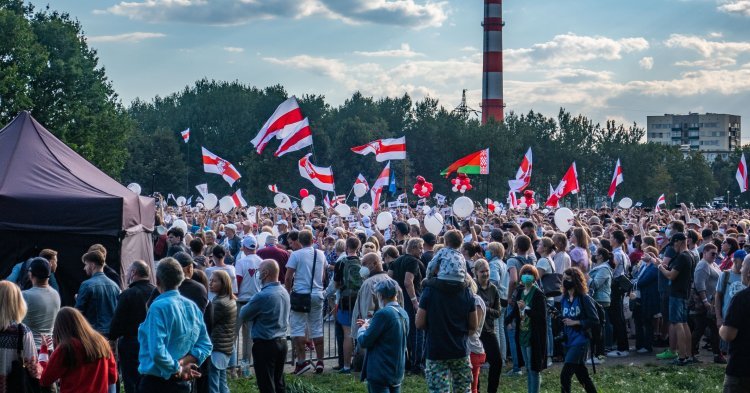It was a scene rich in symbolism. On Tuesday, August 11th, the inhabitants of Minsk laid flowers near the place where a young man had lost his life in the protests shaking the Belarusian capital – and indeed, all of the country – in the aftermath of the August 9th election. This most recent election, like all other previous elections, had resulted in the victory of Alexander Lukashenko, widely regarded as the “last dictator of Europe”. At nearly 66 years old, he has nevertheless aspired to a sixth term. According to the official election results released this past Monday, Lukashenko obtained roughly 80% of the votes cast, only slightly less than in the last election in 2015.
These results are considered by many to have been extensively falsified. The next day, for example, the European Union demanded that the votes be “counted and published accurately”. The rigging of the election was also vigorously denounced by Ales Bialiatski, the president of Viasna, a Belarusian human rights organisation based in Minsk. In an interview with the French newspaper Libération, furthermore, he emphasized the “unprecedented” mobilisation of large segments of the population against the regime.
Unprecedented protests
“Unprecedented” is certainly not an inappropriate choice of words. Until now, Belarus has not seen many large protests. The former Soviet republic has not had much experience with democracy (which officially existed only between 1991 and 1994, in the years right before Lukashenko came to power). Nor has its civil society ever been that well-developed. The electoral challenge mounted during this presidential election was the work of a somewhat organised political opposition and a few independent journalists, but not the people of the country as a whole.
The protests this year, however, might end up being a major turning point in Belarus’s turbulent political history – if only because of their duration. Indeed, they are an outcome of the so-called “anti-cockroach revolution” that began all the way back in June. Shortly after beginning, protests began to take hold, not only in the capital, Minsk, but also in nearly 30 other towns and cities, such as Brest, on the border with Poland. “Even though there was not originally a concrete plan of action,” Ales Bialiatski explained, “Belarusians went out into the streets, setting all of Minsk abuzz. There were cars honking wildly, people gathering chaotically throughout the city, and of course, arrests. It was almost as if war had come to Belarus, even though a state of emergency had not been declared.”
This new “car horn rebellion” was visibly and severely repressed by Belarus’s paranoid regime, which feared that the situation would transform into something resembling the Euromaidan protests in Ukraine in 2014. The government’s security forces employed harsh methods against protesting citizens: rubber bullets, tear gas, and billy clubs were all levied to keep demonstrators in line. The night after the election was particularly violent: thousands of people were either sent to the hospital, or placed under arrest. “I can’t remember seeing protests and repression on this scale in Belarus before”, Bialiatski added. “The current crackdown has been more brutal and more comprehensive than the ones after previous elections. But what is also especially unprecedented here is the degree of citizen involvement in the electoral process.”
A determined opposition
The increased activity of Belarusian civil society is also relevant because this year, the political opposition was more organised, and helped create real hope for change. Such hope was incarnated in the figure of Sviatlana Tsikhanovskaya, the wife of Sergei Tsikhanovsky, a celebrated blogger who was imprisoned at the end of May. It was Sergei who originally intended to register as a presidential candidate, but after his arrest, his wife took over his campaign. Supported by many other figures from the opposition, including Veronika Tsepkalo, the wife of the imprisoned dissident Viktor Barbariko, Tsikhanovskaya led a campaign that was widely commented upon in the media. At the culmination of her campaign, only 10 days before the election, she held an outdoor rally in Minsk that drew 25,000 people. With little more than 10% of the vote (according to official reports), the opposition was repelled forcefully by the ruling government. Yet Tsikanovskaya claimed that she would have won the election if it hadn’t been rigged. “The authorities should think about how to peacefully hand over power to us”, she insisted. “I consider myself the winner of this election.”
It nevertheless seems rather unlikely that Sviatlana Tsikanovskaya will be the new face of Belarus’s political opposition. Under immense pressure from the authorities, she made her way on August 11th to Lithuania, a country in the EU which is quite accustomed to welcoming fleeing dissidents from Minsk. In a recorded video message, Tsikhanovskaya justified her decision by expressing her desire to be with her children, and seemed to renounce her struggle against the Belarusian government. “I thought that this whole campaign toughened me up very much and gave me so much strength that I could stand everything. But, probably, I remained the weak woman I initially was.”
Despite this most recent development, the protestors in the streets of Minsk have not faltered. As such, they could present a serious challenge to the ruling class in Belarus. Many Belarusian citizens are no longer willing to tolerate the lack of democracy in the country, or the systematic repression of even the slightest sign of rebellion. It may be that nothing comes of these events, given how determined Lukashenko seems to be. However, the protestors have certainly delivered a moral defeat to the president, who has often seen fit to refer to himself as the batka (“father”, in Belarusian) of the country. The upcoming days and weeks will therefore be decisive for the country: either the ossified status quo will prevail, or the wave of popular discontent will bring about a new chapter in the history of this tiny Eastern Europe republic.
Ambiguous relations with Russia
Much more so than the EU, Russia is an actor that could bring the situation in Belarus to a tipping point – in one sense as well as another. Vladimir Putin is the only notable ally of Alexander Lukashenko, even though the two men hardly like one another, as Claire Gatinois, a journalist for Le Monde, has pointed out.
Indeed, Putin’s Russia is trying to keep Belarus within its zone of influence, most notably through integration projects like the Eurasian Economic Union, or the Union State of Russia and Belarus. Alexander Lukashenko would not actually like to become a “governor of a province of the Russian Federation”, though, and has not hesitated in the past to oppose the master of the Kremlin. Tensions between the two leaders also extend to more strategic areas, such as the procurement and supply of energy. Moscow has no qualms about using its vast reservoirs of natural gas as a weapon with which to pressure Minsk, which relies heavily on discounted hydrocarbons from Siberia.
Although its influence waxes and wanes with time, the European Union has a role to play in the crisis in Belarus. The country is a member of the Eastern Partnership, and is presently in the process of negotiating a visa facilitation plan with the EU. Even if the sanctions against Minsk have mostly been lifted since 2016, Brussels continues to apply a policy of “critical engagement” in its relations with Belarus. But the scenes of violence from the past few days could have a significant influence on the European perception of this situation. The European Union should try to support the protestors in a much more explicit way, without also falling into the trap of supporting extremists disguised as anti-Lukashenko demonstrators.
As affirmed by the Young European Federalists treasurer Chris Powers, “the future of Belarus is democratic and European.” As an organisation, the Young European Federalists have constantly fought for the establishment of democracy in Belarus. This leitmotif should guide the actions of those who would like to support the people of Belarus in their relentless quest for democracy and freedom.


Follow the comments: |
|
